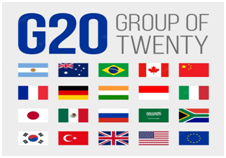

Context
In a joint declaration brought out at end of the G20 summit in Bali where the multilateral organisation has several discussions on economic difficulties and insecurity worldwide.
- Let us assess the points been discussed at the event and how they are in lines with India’s perspective for Global order.
About
Key Highlights of the G20 event:
- On Russia-Ukraine Conflict: The G20 summit had come on a common ground and addressed the impact that western sanctions against Russia have had on the global economy.
- Clarified that G20 is not the forum to ‘resolve security issues’ but these issues can have significant consequences for the global economy.
- On Food Security: The declaration from the G20 leaders expressed concern about the challenges to global food security which has been intensified by the on-going conflicts and tensions, and committed to take ‘urgent actions’to help developing economies.
- The text of the outcome document also acknowledged the Russian donations of fertilizers facilitated by the World Food Programme and the Black Sea Grain Corridor.
- Against Terrorism and Money laundering: The G20 declaration also called upon the international community to step up efforts to counter money laundering, terrorism financing and proliferation financing and urged the Financial Action Task Force (FATF) and FATF Style Regional Bodies to ‘lead global action to respond to these threats.
- Against War: The leaders at G20 have clearly mentioned that they all are against the war, as it causes great human sufferings and effects Global rule-based order.
Differentiating Previous Meet with the recent One:
|
G20 at Italy in 2021 |
G20 at Bali in 2022 |
|
|
India in lines with G20:
India has already started working on several points being discussed during the event:
- G20 Presidency as an opportunity for India in 2023:
- The growing conflicts and spiralling climate crises have kept global and regional food security as one of the priority agendas of the G20 for many years now.
- Against this backdrop, India’s presidency of the G20 offers a historical opportunity for India to share its successful journey in moving from a food-deficit nation to a food-surplus nation.
- India can play a key role to address the growing challenges of food security for creating resilient and equitable food systems.
- For Food security: The summit created a mechanism focused on five identified action tracks:
- Ensure access to safe and nutritious food for all;
- Shift to sustainable consumption patterns;
- Boost nature-positive production;
- Advance equitable livelihoods, and
- Build resilience to vulnerabilities, shocks, and stress
- Against Terrorism: India with its INTERPOL meeting recently again cleared its No-tolerance policy for Terrorism.
- On Russia-Ukraine Conflict: Being not given any clear statement for India’s support to the party in the war between both countries, India has mentioned that it is ready to go with any negotiation that remains in peace and non-weaponised.
|
Objective of the Indian Presidency:
|
Points remained Unaddressed at the meet:
- No Bilateral agreement has been signed in the event regarding the trade and crisis of fuel supplies.
- The issue of Infrastructure finances for food grain storage and Agriculture has been noted.
- Funds for research and development in the field of Biotechnology and GM-crops are unnoticed.
Bidirectional perspectives between G20 nations and India:
- Domination of Western Powers: As the Organisation has large number of western Powers included, it makes the a biased discussions on their issues instead of several developing countries which India has a role with like, Bangladesh, Sri-lanka and Central Asian countries.
- Asian agenda unaddressed: Like Trade sanctions for developing countries.
|
The G20:
|
More on News
India also attended the 40th East Asia summitand 41st Association of Southeast Asian Nations (ASEAN) held in Cambodia and highlighted its stance on global issues and its agenda for upcoming G20 summit.
Highlights of the Summit:
- Location:Cambodian capital (Phnom Penh).
- The three-day summit also included the East Asia Summit.
- Major Participants other than ASEAN countries included S. President Joe Biden, Chinese Prime Minister Li Keqiang, Russian Foreign Minister Sergey Lavrov and others.
- India’s external affairs Minister Mr. S jaishankar took part in the summit.
- Major issues:The following issues were discussed:
- Crisis in Myanmar
- Russia-Ukraine War and disrupted global supply chains
- Global Consensus and coordination
- For World's common interest to cooperate to solve differences peacefully
- Regional tensions between the US and China
- Climate change
|
The ASEAN |
The East Asia Summit (EAS) |
|
|



